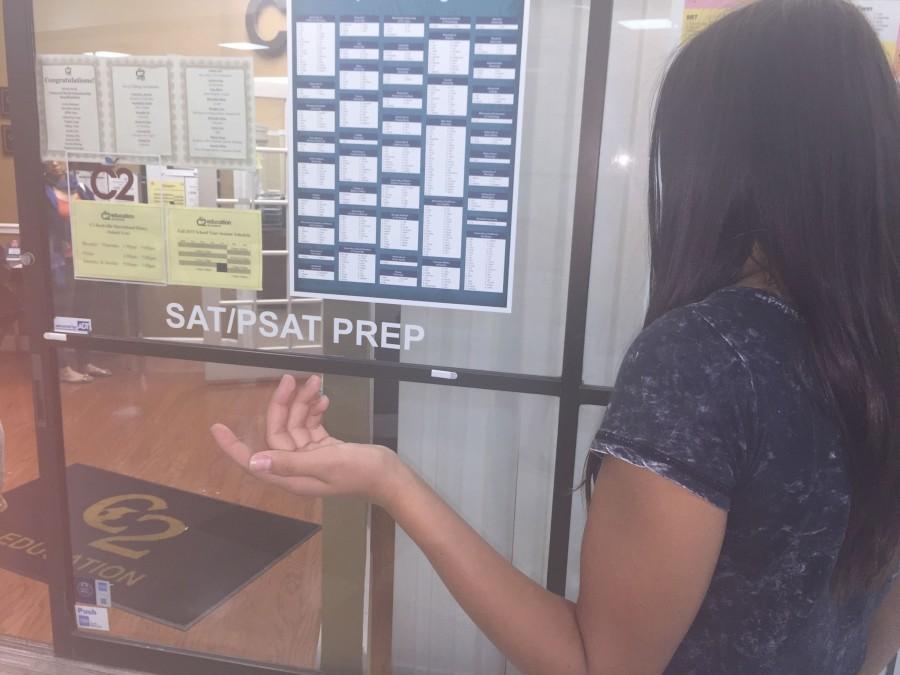Students React to Increasingly Popular Test-Optional Policies
Sophomore Eliana Espinosa wonders whether to sign up for SAT prep or not, depending on whether colleges will require the test.
September 30, 2015
This past July, George Washington University became the largest private university in the top 100 best ranked schools in the US to get rid of rigorous admissions requirements, following the trend of college admissions becoming test optional.
While students and professionals nationwide believe that standardized testing is not an effective way to qualify a student to attend a university, others argue that the SAT and ACT are crucial for comparing students in their application process. Many liberal arts colleges, and increasingly, large private universities, have decided that the idea of one test determining a student’s future is unjust.
According to a Feb. 18, 2014 NPR article, 800 of 3,000 four-year colleges and universities in America are now eliminating the requirement. An array of smaller liberal-arts colleges, including local American University, have now become test-optional, making students nationwide question America’s addiction to standardized tests.
CHS students have contrasting views of the new policy. Some believe that the SAT and ACT are crucial factors to their application processes, while others believe that it is not a necessity.
Senior Dana Lotwin believes that unless the SAT and ACT are replaced with another requirement, getting into a school would most likely be based almost purely on GPA, and there would be no other heavily-considered requirements for admissions officers to make their decisions.
“The SAT and ACT tests are supposed to predict how well you are going to do in school,” Lotwin said. “So if they remove them, they’re probably proving to not be so accurate.”
Senior Adam Votow agrees with Lotwin and brings up another interesting point regarding financial aid.
“I personally think that the test optional policies are ridiculous,” Votow said. “While you don’t have to submit your scores, not only do they still recommend that you do, but in those places you will also not be considered for any academic scholarships.”
According to collegematchmaker.com, there are many academic scholarships that are strictly merit-based, and they take SAT and ACT scores into great account when considering their applicants.
Other students believe that the relevance of the SAT/ACT in admissions depends on the student’s academic record and current grade situation.
“For some students it could be beneficial but detrimental to others,” senior Kimia Zarabian said. “A student with a high GPA and low test scores will benefit greatly, but one that has both high GPA and high test scores may not necessarily benefit, since now there is more competition.”
According to the same NPR article, the former dean of Bates College, William Hiss, conducted a national study published this past spring to test whether standardized test scores and academic success in college were correlated.
The study covered 123,000 students at 33 liberal arts and private universities over eight years, and the results have seemed to persuade colleges to take on this new approach to admissions.
Results showed that high school grades were the best predictor of a student’s success in college, as those with modest test scores but better grades did better in college than those with modest grades and better test scores. Conclusively, Hiss found that there was practically no difference in grades and graduation rates between test “submitters” and “nonsubmitters.”
However, without standardized test scores, more importance will be weighed on other application assets such as personal essays, extracurriculars and most importantly GPA.
According to CHS College Counselor Luana Zimmerman, her assumption is that high school coursework and grades are a “better predictor” than standardized tests.
According to an Oct. 7, 2014 Wall Street Journal article, the SAT has just become another area in American life in which those with the most financial benefits achieve more than those with less. Students who can afford expensive SAT preparation will tend to achieve higher scores on their standardized tests. On average, students in 2014 in higher income brackets outscored students in lower brackets on every section of the test, according to calculations from the National Center for Fair & Open Testing, using data provided by the College Board.
“Schools would remove test requirements for many reasons, but an important one may be due to financial status,” Zarabian said. “Many applicants who are wealthier can afford to take SAT and ACT classes and they take the tests many times, but those who cannot afford it are at a disadvantage.”
According to a Sept. 2012 study from the journal Psychological Science, SAT scores combined with high school grades were predictive of first-year academic success for all socioeconomic statuses.
“I think test optional policies are a great stress relief for people who feel pressured, feeling as if test scores are their only hope of getting into the college that they want,” senior Gina Dehdashty said. “The policies will help to alleviate the tension, and in turn cause the student to perform better.”


